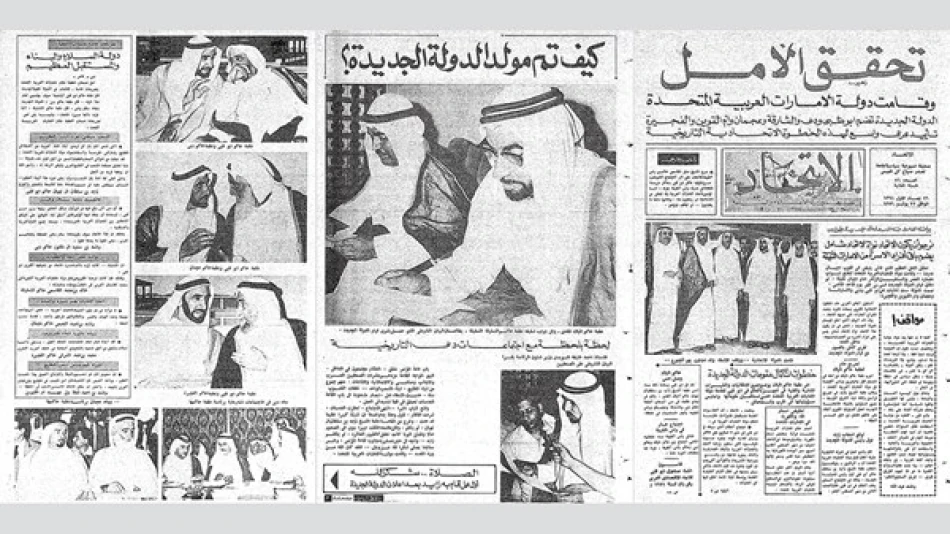
Renewed Allegiance: Emirati National Unity Celebration Inspires Citizens
UAE Establishes "Union Covenant Day" to Commemorate Historic Federation Agreement
The United Arab Emirates has officially designated July 18 as "Union Covenant Day," marking the pivotal 1971 meeting where founding father Sheikh Zayed and fellow rulers signed the federation declaration and constitution. This strategic move by President Sheikh Mohammed bin Zayed Al Nahyan reinforces national identity while positioning the UAE as a regional powerhouse that has transcended its oil-dependent origins to become a global hub for innovation and diplomacy.
Historical Significance of the July 18 Agreement
The 1971 federation agreement represented a remarkable achievement in Middle Eastern politics, uniting seven separate emirates under a single constitutional framework. Unlike many post-colonial mergers that failed due to tribal conflicts or economic disparities, the UAE's federation succeeded because of Sheikh Zayed's vision of shared prosperity and pragmatic governance.
The timing of this new national observance is particularly strategic. As the UAE approaches its 53rd anniversary of independence, the country has evolved from a collection of trading ports and pearl-diving communities into a diversified economy that rivals Singapore and Hong Kong as a regional financial center.
Strategic Messaging Behind the New Holiday
Reinforcing National Unity
President Sheikh Mohammed bin Zayed's directive to establish this day reflects a broader effort to strengthen Emirati identity amid rapid demographic changes. With expatriates comprising roughly 90% of the population, the UAE faces the challenge of maintaining cultural cohesion while remaining globally competitive.
This initiative parallels similar moves by other Gulf states. Saudi Arabia has invested heavily in national day celebrations and cultural festivals as part of Vision 2030, while Qatar used the 2022 World Cup to project national pride and unity.
Economic and Diplomatic Positioning
The emphasis on the UAE's "competitive advantage" and "regional and global leadership" signals confidence in the country's post-oil economic model. The UAE has successfully positioned itself as a neutral mediator in regional conflicts while building strategic partnerships with both Western and Eastern powers.
This diplomatic flexibility has paid dividends. The UAE's trade volume exceeded $500 billion in 2023, with significant growth in technology, renewable energy, and financial services sectors. The country's ability to maintain relationships with Iran while strengthening ties with Israel demonstrates the pragmatic approach that originated with the 1971 federation agreement.
Implications for Regional Leadership
The new holiday underscores the UAE's ambition to serve as a model for effective governance in the Middle East. While neighboring countries grapple with economic challenges and political instability, the UAE has maintained steady growth and social stability.
The reference to "comprehensive development" likely alludes to the UAE's diversification strategy, which has reduced oil's contribution to GDP to approximately 30%. This transformation mirrors successful models in East Asia, where countries like South Korea and Taiwan leveraged strategic planning and international partnerships to achieve rapid development.
Looking Forward: Sustaining the Federation Model
As the UAE enters its sixth decade, the establishment of Union Covenant Day reflects both confidence and caution. The country's leadership recognizes that maintaining unity and prosperity requires continuous reinforcement of shared values and common purpose.
The success of this initiative will likely be measured not just in ceremonial observance, but in its ability to inspire continued innovation and adaptation. The UAE's track record suggests that this new holiday will become another tool in the country's sophisticated approach to nation-building and regional leadership.
For investors and international partners, the UAE's emphasis on historical continuity and future ambition signals a stable, predictable environment for long-term engagement. This consistency has made the UAE a preferred destination for multinational corporations and sovereign wealth funds seeking exposure to Middle Eastern growth markets.
Most Viewed News

 Layla Al Mansoori
Layla Al Mansoori






